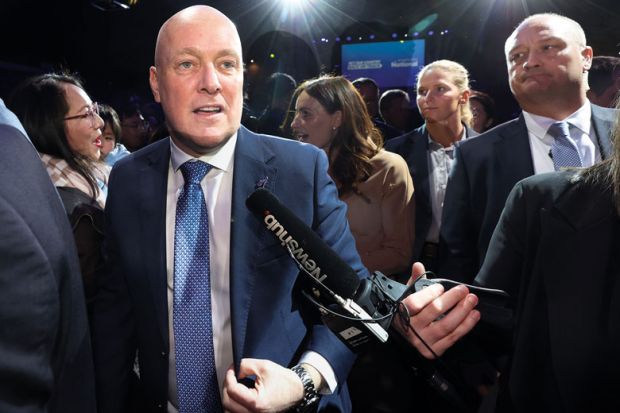New Zealand’s new government will rearrange medical training and “reinvigorate” international education but is unlikely to address universities’ funding shortfalls or undertake a sectoral review as promised by the ousted Labour administration.
The result of the 14 October election will see Labour replaced by a coalition of the centre-right National and right-leaning Association of Consumers and Taxpayers (Act) parties, possibly also including the populist New Zealand First. The government’s composition is unlikely to become clear before overseas and out-of-electorate votes are tallied on 3 November.
The coalition partners’ focus on restraining government spending militates against any major change from Labour policies that saw funding for the sector continually slipping behind inflation.
And while there may be a change of tune on the decolonisation policies expressed in NZ First’s hostility to “racist separation” and Act’s promise to hold a referendum on the 1840 Treaty of Waitangi, the impact on universities might be limited.
Tertiary education analyst Dave Guerin said universities’ responses to the treaty had become “baked in” over the past six years, with encouragement from Labour. “I don’t think anything the [new] government does will suddenly change the environment that much in tertiary education – it might just slow the direction of travel,” he said.
He added that, as the coalition heavyweight, the National Party would be happy to let the junior partners “take the heat” on any push against indigenisation policies. But its major focus for universities would be on alleviating the sector’s financial problems by reducing inflation and stimulating international education earnings through faster visa processing and improved post-study work rights.
Former education bureaucrat Roger Smyth said the National Party and Act would “unpick” the 2020 merger of New Zealand’s polytechnics into the standalone Te Pūkenga. “That’s really the big thing that’s likely to happen in tertiary education,” he said. The governing parties “see international students as the way to resolve the financial problems of universities”.
Mr Smyth said the minor parties’ views on indigenous issues would make little difference to universities as independent statutory organisations. “Some of the rhetoric will tone down, but in practice the system is going to continue to operate in broadly similar ways, [although] those sorts of debates could well play out to some extent in schooling,” he said.
Sean Phelan, an associate professor in communication studies at Massey University, said the new governing parties could pursue “culture war politics” by demeaning universities in general and the humanities in particular.
Dr Phelan said the types of firebrand rhetoric familiar in US Republican circles would not “play as well in New Zealand because I don’t think there’s the same history of demonic anti-left paranoia here. But I would be concerned that there could be political hay to be made in mainstreaming a more euphemised, local version.”
Massey theoretical chemist Peter Schwerdtfeger said he expected pushback against a wave of “postmodernism” in universities, as indigenous “mysticism” was inserted into science curricula. “It’s coming in the biological sciences, chemistry and other subjects under the umbrella of Te Tiriti [the Treaty of Waitangi] in the universities. We are told we have to accept it; we cannot even criticise it because it’s sacred.”
Professor Schwerdtfeger said that, although the new government would be unlikely to intervene directly in university curricula, it could reshape New Zealand’s Tertiary Education Commission. “If they change the membership of that commission, you’ll see some major changes.”
Register to continue
Why register?
- Registration is free and only takes a moment
- Once registered, you can read 3 articles a month
- Sign up for our newsletter
Subscribe
Or subscribe for unlimited access to:
- Unlimited access to news, views, insights & reviews
- Digital editions
- Digital access to THE’s university and college rankings analysis
Already registered or a current subscriber? Login








